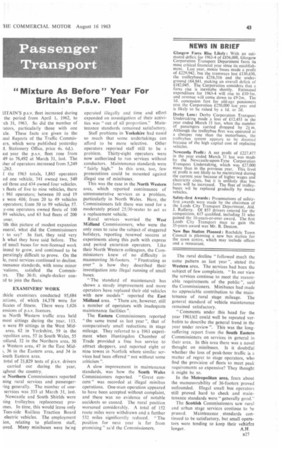Passenger Transport
Page 45

If you've noticed an error in this article please click here to report it so we can fix it.
"Mixture As Before" Year For Britain's P.s.v. Fleet
LlTAIN'S p.s.v. fleet increased during the period from April I, 1962, to .ch 31, 1963. So did the number of -ators, particularly those with one cle. These facts are given in the tual Reports of the Traffic Commisers, which were published yesterday 4. Stationery Office, price 4s. 6d.). ast year the p.s.v. fleet rose from 49 to 76,492 at March 31, last. The iber of operators increased from 5,249 ,263.
f the 1963 totals, 1,865 operators ed one vehicle, 741 owned two, 540 ed three and 434 owned four vehicles.
fleets of five to nine vehicles, there 961 operators; between 10 and 19 e were 416; from 20 to 49 vehicles operators; from 50 to 99 vehicles 57. y-one operators owned fleets of 100 99 vehicles, and 63 had fleets of 200 over.
'ith this picture of modest expansion eneral, what did the Commissioners to say? In fact, they said very h what they have said before. The of small buses for non-licensed work inued to grow, and continued to be peratingly difficult to prove. On the le, rural services continued to decline. ntenance standards, with some minor • vations, satisfied the Commis
u.s. The 36-ft. single-decker conc1 to join the fleets.
EXAMINERS' WORK :hide examiners conducted 95,684 ections, of which 14,378 were for ficates of fitness. There were 1,626 ensions of p.s.v, licences.
se North Western traffic area held most sittings during the year, 113. .c were 89 sittings in the West Midarea, 62 in Yorkshire, 59 in the -opolitan area, 57 in South Wales, 55 :otland, 52 in the Northern area, 50 e Western area, 47 in the East Midi, 36 in the Eastern area, and 34 in louth Eastern area.
total of 21,829 tests of ti.s.v. drivers carried out during the year, rghout the country.
ie Northern Commissioners reported fling rural services and passenger,ing generally. The number of oneservices was 333 at March 31, last. Newcastle and South Shields were -ling trolleybus replacement protines. In time, this would leave only Tees-side Railless Traction Board electric vehicles. The employment ion, relating to platform staff, oved. Many minibuses were be'ng
operated illegally and time and effort expended on investigation of their activities was " out of all proportion." Maintenance standards remained satisfactory.
Staff problems in Yorkshire had eased so much that some undertakings can afford to be more selective. Other operators reported staff still to be a problem. Thirty-eight operators were now authorized to run services without conductors. Maintenance standards were "fairly high." In this area, too, few prosecutions could be mounted against illegal use of minibuses.
This was the case in the North Western area, which reported continuance of unremunerative services as a problem, particularly in North Wales. Here, the Commissioners felt there was need for a moderately priced 25/30-seater to act as a replacement vehicle.
Rural services worried the West MkIland Commissioners, who were the only ones to raise the subject of staggered holidays, reporting renewed success at experiments along this path with express and period excursion operators. Like their North Western colleagues. the Commissioners knew of no difficulty in manceuvring 36-footers. " Frustrating as ever" is how they described their investigation into illegal running of small buses.
"The standard of maintenance has shown a steady improvement and more operators have replaced their old vehicles with new models" reported the East Midland area. "There are, however, still a number of operators with inadequate maintenance facilities ".
The Eastern Commissioners reported "the same trend as last year ", that of comparatively small reductions in stage mileage. They referred to a 1961 experiment when Huntingdon Chamber of Trade provided a free bus service to attract shoppers, and reported eight or nine towns in Norfolk where similar services had been offered " not without some criticism ".
A slow improvement in maintenance standards, was how the South Wales Commissioners reported. "Great concern" was recorded at illegal minibus operations. One-man operation appeared to have been accepted without complaint, and there was no evidence of notable accidents so caused. The rural position worsened considerably. A total of 152 route miles were withdrawn and a further 532 miles significently reduced. "The position for next year is far from promising" sad the Commissioners. The rural decline "followed much the same pattern as last year ", stated the Western area, The services had been the subject of few complaints. "In our view the services continue to meet the reasonable requirements of the public ", said the Commissioners. Minibuses had made no appreciable contribution to the maintenance of rural stage mileage. The general standard of vehicle maintenance remained satisfactory.
"Comments under this head for the year 1961/62 could well be repeated verbatim to describe the general trend in the year under review ". This was the longsuffering report from the South Eastern Commissioners on services in general in their area. In this area there was a novel thought on minibuses. Is it doubtful whether the loss of peak-hour traffic is a matter of regret to stage operators, who find the provision of fleets to meet peak requirements so expensive? They thought it might be so.
In the Metropolitan area, fears about the manceuvrability of 36-footers proved unfounded. Illegal small bus operators still proved hard to check and maintenance standards were "generally good."
The Scottish Commissioners saw rurai and urban stage services continue to be pruned. Maintenance standards continued to be satisfactory, but small operators were tending to keep their vehicles longer. A.H.












































































































